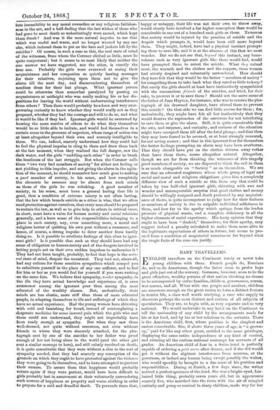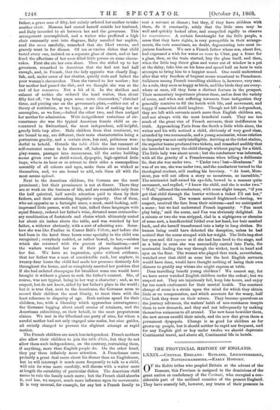BABY TRAVELLERS.
ENGLISH travellers on the Continent rarely or never take young children with them. French people do, Russians do, and so do Americans, though the latter seem to prefer boys and girls just out of the nursery. Germans, however, sewn to be the great offenders, wealthy persons of that nation thinking no shame to be accompanied by entire families, children, governesses, nurses, wet-nurses, and all. What with one people and another, children are numerous enough on the great routes to form a distinct feature in tourist life, a class well worth studying, a race who supply to observers perhaps the most distinct and curious of all subjects of speculation. They arc, to begin with, so very separate and so very national. We would undertake in any hotel on the Continent to tell the nationality of any child by the arrangements made for his or her food, and by his or her relations to the servants. There is the American child, first, whose position is the simplest and easiest conceivable. She, if above three years of age, is " a grown- up," paid for like any other guest, entitled to the same privileges, displaying the same entire independence of any kind of control, and evincing all the curious national contempt for servants of all grades. An American child of four in a Swiss hotel is perfectly capable of ordering a petit verre after dinner, and if she did would get it without the slightest interference from mamma, or the governess, or indeed any human being except possibly the waiter, who would speedily be brought to a due sense of his position and responsibilities. Dining at Zurich, a few days since, the writer noticed a perfect specimen of the kind. She was a bright-eyed, fair- haired little thing, probably seven years old, but in appearance scarcely five, who marched into the room with the air of mingled curiosity and pomp so comical in sharp children, made way for her father, a grave man of fifty, but calmly ordered her mother to take another chair. Mamma had seated herself outside her husband, and Baby intended to sit between her and the governess. This arrangement accomplished, and a waiter who proffered a high chair summarily sent into disgrace, Baby unrolled her napkin, read the menu carefully, remarked that she liked sweets, and gravely went in for dinner. Of ten or twelve dishes that child tasted every one, insisted on a separate glass of claret, and at last fixed the affections of her over-filled little person on some cheese- cakes. First she ate her own share. Then she sidled up to her governess, remarked in American that she had not had half enough, and, in French, that the lady opposite was clearly Eng- lish, and, under cover of her chatter, quietly stole and bolted the poor woman's cheesecakes. Then she turned to her mother ; but her mother had passed the dish, and we thought she was at the end of her resources. Not a bit of it. In the shrillest and calmest of trebles she ordered the head waiter, then about fifty feet off, " to bring papa some more cheesecakes," clutched three, and putting one on the governess's plate,—either out of a theory of restitution, as we hope, or an idea of making her an accomplice, as we fear,—bolted the other two, and then nudged her mother for admiration. With insignificant variations of cir- cumstance she was the typical American female child as en- countered in Switzerland, the most independent, self-helpful, greedy little imp alive. Male children from that continent, we are bound to say, are different, their main characteristics being a portentous gravity, and a certain slow, but real, politeness won- derful to behold. Outside the table d'hote the last remnant of self-restraint seems to be thrown off, balconies are turned into play-rooms, passages into racecourses, till the entire building seems given over to shrill-voiced, dyspeptic, high-spirited little imps, who in an hour or so attract to their sides a cosmopolitan assembly of all colours and ages, make them all as wicked as themselves, and, we are bound to add, rule them all with the most serene aplomb.
Next to the American children, the German are the most prominent ; but their prominence is not at dinner. There they are at work on the business of life, and are remarkable only from the half quizzical, half servile attention paid to them by their fathers, and their astounding linguistic capacity. One of them, who sat opposite us a fortnight since, a meek, staid-looking, self- impressed little person, with red hair, talked three languages with equal fluency, ordered her father's wine, dictated some extraordin- ary combination of footstools and chairs which ultimately seated her about six inches above the table, and was watched by her father, a widower obviously, with a sort of admiring awe. Some- how she was like Pauline in Currer Bell's V illette, and before she had been in the hotel three hours some specialty in the child was recognized ; everybody nodded, or rather bowed, to her,—salutes which she returned with the gravest of inclinations,—and the waiters watched her as if their places depended on her fiat. We have an impression, quite without evidence, that her father was a man of considerable rank, but anyhow, in twenty-four hours the child had made her presence distinctly felt throughout the house, and so completely asserted her position that if she had ordered champagne for breakfast some one would have brought it without a glance to seek the father's consent. She, of course, was not typical, being in her way a character ; and, as we suspect, but do not know, aided by her father's place in the world ; but it is true that, next to the Americans, the Germans seem to accord their children the most liberty, to treat them with the least reference to disparity of age. Both nations spend for their children, too, with a liberality which approaches extravagance ; the Germans lugging about small armies of retainers, and the Americans submitting, on their behalf, to the most preposterous claims. We met in the Oberland one party of nine, for whom a careful mother had not only engaged nine mules, but nine guides, all strictly charged to prevent the slightest attempt at rapid motion.
The French children are much less independent. French mothers also allow their children to join the table d'hôte, but they do not allow them such independence, on the contrary, restraining them, if anything, more than English people do. On the other hand, they pay them infinitely more attention. A Frenchman cares probably a great deal more about his dinner than an Englishman, but he will interrupt it much more frequently to talk to a child, will mix its wine more carefully, will discuss with a waiter more at length the suitability of particular dishes. The American child seems to rule the family much more ; but the French child absorbs it, and has, we suspect, much more influence upon its movements. It is very unusual, for example, for any but a French family to seat a servant at dinner ; but they, if they have children with them, do it constantly, solely that the little ones may be well and quickly looked after, and compelled rigidly to observe les convenances. A certain forethought for the little people, a sense that they have rights, is very perceptible in their arrange- ments, the care sometimes, no doubt, degenerating into most in- jurious fondness. We saw a French father whose son, about five, had expressed a wish for water en route to Chur, pay a franc for a glass, then, as the train started, buy the glass itself, and then, when the little imp threw glass and water out of window in a pet at the delay, take him on his knee and spend half an hour in vain attempts to bring him to a happier mood. One could understand after that why freedom of bequest seems unnatural to Frenchmen. Sulkiness among French travelling children is, however, very rare. As a rule, they seem as happy as birds, and like birds they are every- where at once, till they form a distinct feature in the prospect. Their momentary importance pleases them, and so does the variety of scene, and when not suffering torments from indigestion they generally contrive to fill the hotels with life, and movement, and happy if somewhat shrill laughter. Though not left independent, they are left with servants much more than English children are,. and not always with the most beneficial result. They see too• much of the great vice of French servants, their indifference to truth. Approaching Paris from the South a little while since, the writer and his wife noticed a child, obviously of very good class, attended by two nursemaids, and a young seminarist, whose relation to theparty was not easily intelligible. Arriving at the ticket station, the superior bonne produced two tickets, and remarked audibly that she intended to carry the child through without paying for a third. The little lady was about seven ; but the conducteur was informed, with all the gravity of a Frenchwoman when telling a deliberate lie, that she was under two. " Under two ! but—Mesdames." It was of no use, she was under two, and the conducteur turned to the theological student, still reading his breviary. " At least, Mon- sieur, you will not affirm a story so monstrous, so incredible.!' The seminarist half-raised his eye-lids, bowed in a manner quite sacrosanct, and replied, " I know the child, and she is under two.." " Well," affirmed the conducteur, with some slight temper, "if you get that child through the barrier without a ticket I'll eat her,!' and disappeared. The women seemed frightened—having, we suspect, received the fare from their mistress—and we anticipated a scene ; but we had underrated French ingenuity. " Fan must play baby," said the nurse, and Fan was obviously delighted. In a minute or two she was stripped, clad in a nightgown or chemise of some sort, a handkerchief folded over her head, her hair combed back, and she herself transformed into a baby in long clothes. No human being could have detected the deception, unless he had noticed that the nurse stooped with her weight. The little imp shut her eyes and did ingenue as if she had been bred to the stage, and as a baby in arms she was successfully carried into Paris, the seminarist leading the way through the wicket, book in hand and eyes on the floor. The women who played that trick, nevertheless, watched over that child as none but the best English servants would have done, would have thought nothing of losing their own dinners to gratify any whims she might express at table.
Does travelling benefit young children? We cannot say, for we have never watched English children under the ordeal ; but we suspect not. They are injuriously fed, keep late hours, and enjoy far too much excitement for their mental health. The constant change of scene is a strain upon the mind for which they obtain little or no compensation, and which accounts for the weary, half blase look they wear on their return. They become querulous as the journey advances, the waiters' habit of non-resistance tempts them to new demands, and they end not infrequently by making themselves nuisances to all around. The new faces bewilder them, the new scenes overfill their minds, and the new diet gives them a permanent dyspepsia. Change is as good for children as for grown-up people, but it should neither be rapid nor frequent, and for any English girl or boy under twelve we should deprecate Continental travel, and above all, Continental life in hotels.



































 Previous page
Previous page